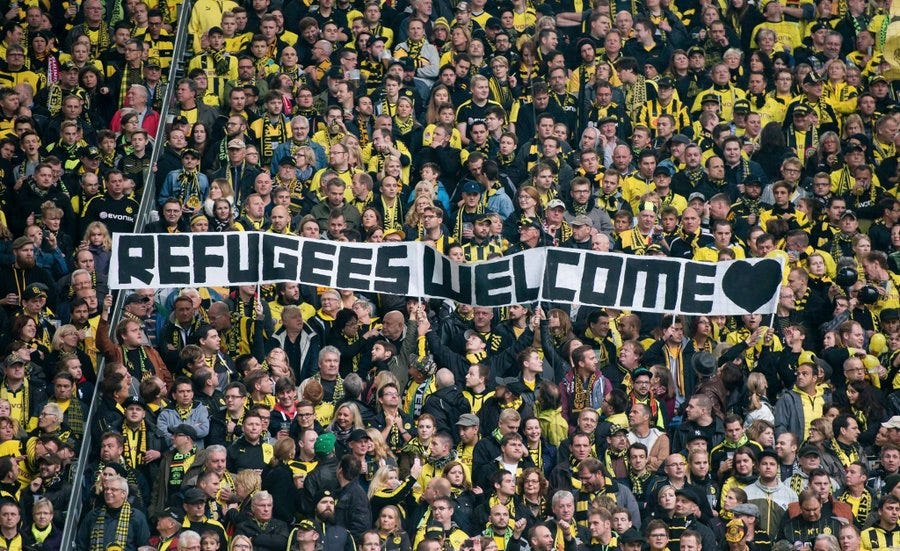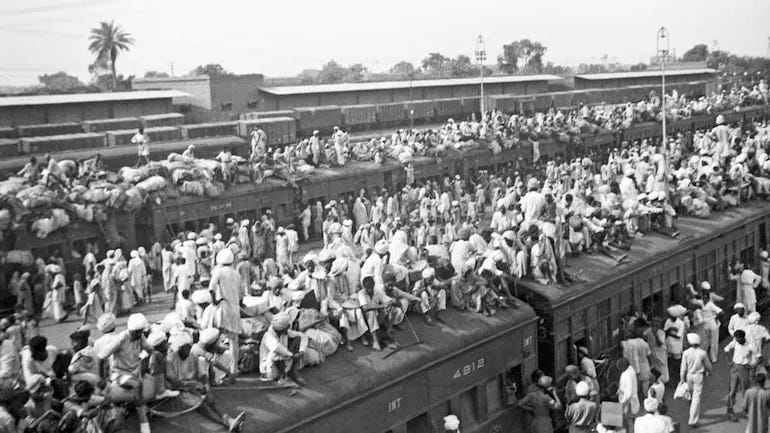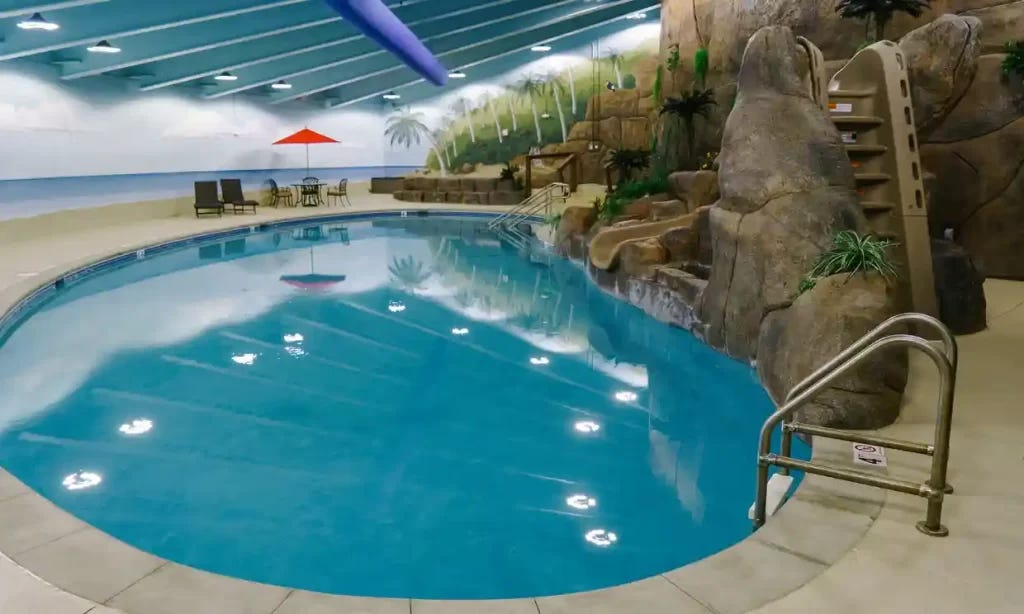Once again, daily our screens are filled with the heart-breaking scenes of many hundreds of thousands of people fleeing.
At such moments, stories are told in the simplest way, and all distinctions are blurred; refugees become just that, refugees. War is in this way a great leveller.
It is true of course that in a war, all citizens of the country that is attacked suffer, but that does not mean that inequality magically disappears. It seems to that if anything, the exigencies, the anarchies of war mean that inequality becomes more important than ever.
Those who can get away first are the able-bodied, often young, and often men. Once conflicts and war become protracted, families club together to find the money to support such a journey, so they are more likely to send those first who are most able to make it in their view, in the hope that they will enable others to follow.
This is not always the case though; in Ukraine, 89% of those arriving in neighbouring countries are women, and children, as men are not allowed to leave - they are required to stay and fight.
Racism also plays a profound part in how successful refugees are in finding a place of safety. The media has been full of the clumsily racist comments of newscasters, and other figures. Bulgarian prime minister Petkov was outspokenly racist: ‘These people are intelligent; they are educated people. This is not the refugee wave we have been used to, people we were not sure about their identity, people with unclear pasts, who could have been even terrorists.’
Similarly clear racism is at play at the Ukrainian borders too, with fleeing nationals from African and Middle Eastern countries who were working and studying in Ukraine being refused to cross into neighbouring countries. Multiple stories have emerged of students from Africa for example being forced to wait for hours at the border, in freezing temperatures or even turned away completely.
The contrast has also been made with scenes going on simultaneously of African migrants being treated appallingly in Spain, including this video of a brutal beating by Spanish police that has been watched over three million times. As one commentator put it, ‘Europe has rediscovered compassion for refugees – but only if they’re white’. We are witnessing the obscenely unequal treatment of refugees from different conflicts; criminalised and left to drown in the Mediterranean or welcomed with open arms by the same European governments.
Less discussed though is the huge importance of what social class refugees and migrants come from, and how much money they have. The relationship between economic inequality and your chances as a refugee or a migrant.
Perhaps the most egregious example of the relationship between economic inequality and migration is the notorious ‘golden passport’. Some EU countries in particular, Malta, Cyprus, Bulgaria, have run a very lucrative passport scheme, through which the extremely rich can buy their way to EU citizenship - all is needed is an investment of roughly 1 million euros. It shouldn’t come as a surprise that this is a favoured way into the EU for many oligarchs, while simultaneously evading paying tax and laundering money. Record numbers of people in the US are renouncing their citizenship; this is largely done by the very rich for tax reasons, buying citizenship instead in a low-tax jurisdiction.
Spare a thought for these super-rich ‘tax-exiles’. Millionaire refugees fleeing from the obligation to be decent citizens and pay their taxes. The contrast with refugees having to hand over their jewellery to ‘compensate’ for the costs of their asylum process, as is the policy in Denmark, couldn’t be more grim.
But even beyond the super-rich, it is largely unquestioned morally that rich nations should be able to decide who they let into their countries by only allowing entry to the better-off and well-educated. This started already after WWII, when countries like Canada, the US, Argentina and Australia, could pick and choose which European refugees they wanted to resettle - based on their ability to work, rather than their need for protection.
In times of war and crisis, when we see huge numbers of refugees very suddenly, economic inequality matters even more. In the confusion and often anarchic situation, the resources you can mobilise matter hugely. Especially when legal routes to migration are closed, your chances are even more linked to what money you can mobilise and who you know.
In his study of partition in India, which saw many millions of people flee across the border between India and the newly created Pakistan, using the newly digitised oral histories of those involved, Shahram Azhar shows that social class made a huge difference to the experience of people.
He identifies three factors that are crucial for the forced migrant; how much wealth they can mobilise to undertake their journey; their informal and formal social networks; their access to state security and particular modes of transport.
There is inequality on the journey; every step of the way, the money you have makes a difference. Oral histories of those who lived through partition showed a huge variation in the experience:
‘With respect to the journey itself, some enjoyed superior access to special trains, ships and aeroplanes with armed protection. Others describe in vivid detail an interminable journey filled with death, disease and unending agony as they walked in long convoys.’
In Europe for example, due to the increased closing of borders, and a visa obligation for non-Europeans, it is almost impossible for both refugees and economic migrants from the Global South to legally enter the EU and the UK. Their only way in is through smugglers, who are demanding large sums of money for their services. Not everyone is able to afford these fees, and many bankrupt themselves or go into major debt to raise the money.
There is inequality on arrival too. In some ways, the world is turned upside down for all. Refugees and migrants who enjoyed a high social status and relative wealth in their home country find themselves at the bottom of the pile in their country of arrival. Often what savings or wealth people have is destroyed or largely depleted to make the journey, leaving previously middle-class people entirely destitute. Societies they arrive in often do not recognise their qualifications, their status, their ability to contribute.
This in turn confuses the already naïve and prejudiced understanding of refugees and migrants by those in rich nations; in seeing their poverty and destitution now or observing the menial jobs they are most likely to be doing, the assumption is that they were always poor, or lower class, which is often very far from the truth.
Yet here too, class still makes a difference. Studies have shown that those from the middle classes often are more quickly integrated into the country they have reached. They are also more likely to be able to speak some English and have contacts or networks outside of their country they can draw on. They are more likely to know people from their own country who are already settled abroad who they can connect with. It’s not easy, but often they are more able to manage then those coming from lower classes.
But more than anything, there is huge inequality in who gets to leave in the first place; who gets the opportunity to find safety, to find sanctuary, to find opportunity.
The super-rich with lots of money can simply fly away and buy a new life somewhere else. They can fly to their second or third homes in safe countries, using the passport they have bought. They can buy themselves a billionaire bunker as a last resort.
Those who can put together some money and have some connections can often find a way out too, but it can still be hugely difficult and what resources they have are rapidly depleted. They are paying a high price for freedom and often must leave their families behind in the hope that they can follow. And of course, sometimes they end up paying the highest price of all, losing their lives on the perilous journey.
Those who are left behind are too the victims of inequality. The people with nowhere else to go, no means of leaving, no chance of escape. Women-led households, the elderly, the disabled; those who are poor. Whether in Kharkiv, Aleppo, Kabul or Sa’na, it is these people who are left to the bombs, to the hunger, and the terrible loss of life.
Again, as in so many situations, inequality kills.
Max is the Head of Inequality Policy at Oxfam International & EQUALS Podcast co-host. He is also Chair of the global People’s Vaccine Alliance. Evelien is the Head of Oxfam’s EU office in Brussels. She is also a guest lecturer at the University of Amsterdam from which she holds a PhD in International Refugee Law.
Image Credits
Featured image: Photo by Kevin Bückert on Unsplash
Refugees Welcome. Credit: @farenet/Twitter
Golden Passport. Credit: Best Citizenshipshttps://best-citizenships.com/2020/04/16/what-is-a-golden-passport/
Crowded trains during the partition of India and Pakistan. It is estimated that at least one million people died and 15 million were displaced. Credit: Commons. Accessed at: https://www.indiatoday.in/news-analysis/story/partition-india-pakistan-line-redrew-south-asian-map-1947-culture-impact-independence-day-1840784-2021-08-14
A swimming pool in the Survival Condo. Credit: Walker Pickering/ the Guardian. Accessed at https://www.theguardian.com/lifeandstyle/2020/aug/01/3m-price-tag-inside-luxury-doomsday-bunker






